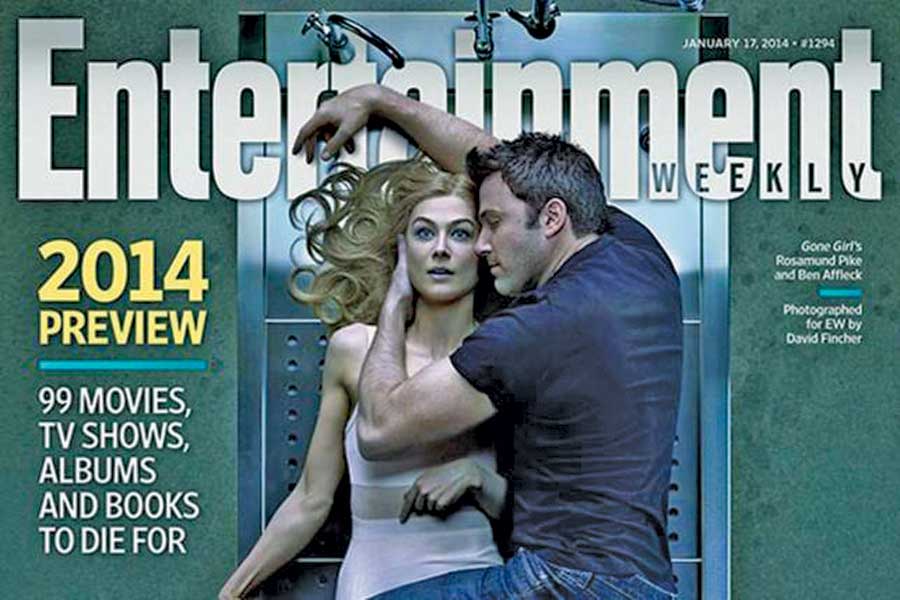“Gossip” Girl
Affleck and Pike in genteel necropsy
I don’t know if advertising is art, but I’m certain there’s an art to advertising – just like I’m certain that’s “Gone Girl”’s lone triumph: its advertising. I wager most readers know all about the movie coming into this piece. They know Ben Affleck’s dark, brooding turn is another in his string of recent career highs. They know the premise: that Affleck’s wife, played by Rosamund Pike of “Die Another Day” and “The World’s End,” disappears – and they know that Affleck’s strange behavior whispers he might have killed her. They know, above all, that the movie is a mischievous look at the dark side of the marriage, almost Satanically glib: a perfect date movie for adults. They know this because they’ve been told so, in every newspaper, on every website popular enough for advertising, in magazines (specifically Entertainment Weekly, the cover of which pictured Affleck snuggling up with rigor-mortified Pike in sardonically genteel marital necropsy), and on every talk show from the Today Show to Live with Kelly & Michael, where all Talk Show Land’s hosts gushed about their plans to see the movie the Friday of its release, as if it were the social event of the season.
So many of these audiences/readers/retirees buy advertising as gospel that they diminish the advertisers’ achievement – how are today’s Don Drapers and Peggy Olsons supposed to sleep at night knowing that people consider their work with the same amount of careful consideration they devote to dropping a deuce? These easy moviegoers equate “advertising” with “expectation,” and when the movie fulfills these expectations – when it can be viewed the way the advertisers suggest – the moviegoer comes out satisfied. “Gone Girl” rules the box office with numbers even an impotent Hollywood studio exec might find stiffening. “Everybody loves it,” Everybody says. C’est le a vie.
Only la vie has been so enhanced, por moi, by the movies, that I react to this reaction the way one might if, at a gathering, one’s charming, kind and beautiful spouse were dismissed by the party in favor of the shamelessly destructive, amoral, cheating whore in the corner. Harsh? Oui. But my lady has been ravaged, and the bandits who have done so roam free. And while I don’t kid myself that the readership feels fit to heed my words and, thereby, imbue me with all the power of popular criticism, if nothing I write matters, all that matters is what I write. I’ll hurl verbal spears yet.
I’m not convinced that if I struck David Fincher in the jugular, he’d bleed. I’m not a member of the Fincher fanbase, which grew when he climbed from music videos to that troubled production “Alien 3” in the ‘90s, after which he directed sludgy, shadow-soaked favorites like “Seven,” “Fight Club,” “The Social Network,” and, most recently, “The Girl with the Dragon Tattoo.” All the same, I’ve never considered him offensive: “Fight Club” has its appeal, “The Social Network”’s real crime was offering a titanic douchebag mythic status, and I like “Alien 3.” But it takes a real dull mind to ignore the potential for playful, operatic filmmaking in a did-they-didn’t-they marriage murder mystery, and a diagnosable emotional deficiency to starve the humor-challenged screenplay of its few drops of humor.
Gillian Flynn wrote the screenplay, as well as the best-selling novel on which it was based. It’s “Twilight” for adults: when Affleck and Pike’s marriage is happy, they’re f—king, and when it suddenly isn’t, their sex is empty, or non-existent. It’s a teenager’s concept of connubial bliss. The two times we see the happy couple extra-coitus, we gauge their marital health by their quippage, the kind of sinkingly sardonic slaps tossed out by Diablo Cody without attention to character, or scene, or anything but the writer’s own cleverness.
The few moments of comic relief are delivered like bodies on cold slabs. The hall of comedy is a morgue to David Fincher. Not a single person in the audience laughed; no doubt somewhere Fincher sighed with relief.
I tracked down Flynn’s screenplay, wondering if it’s as bad as it seems. It’s not. Her tongue is in her cheek, whereas Fincher seems to have bitten his off clenching his teeth against his own scathing cynicism. Dialogue has been subtly changed for added grimness, and sensitive scenes – or, to use Fincher’s words, “HORRIBLE F—KING REVOLTING DISPLAYS OF HUMAN—HUMAN—HUMAN—ICK! HUMANITY!” – have been omitted.
Doubt my characterization of bitter, violent Mr. Fincher? Sayeth the Finch: “I want to make a date movie that results in at least 15 million divorces… I want it to live in that area of slightly tongue-in-cheek, but also morally repellent.” So he said in Empire magazine, before the film’s release.
If Fincher cared about movies – yes, care, David, sound it out: k… k… kayyyyyrrrr – he’d know that portly old Hitchcock’s stories were more morally repellent. “Gone Girl” is repellent, alright, but aesthetically so. It’s drier than a popcorn fart. But, as my “Gone Girl”-loving dad reminded me, people go to movies for the stories. They don’t care, maybe don’t even know, about the emotional potential of the images. They want to smell popcorn; they don’t care if it’s fresh-popped or farted.
Remember that beloved spouse of mine, le cinema? I’d like to think she’s the gone girl – but can you be gone if no one knew you were there?
Tom Benton joined the Basement Medicine staff in spring 2011, assuming the position of editor-in-chief in spring 2012. He continues in that capacity...






